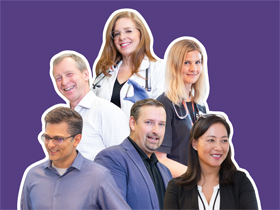Research Month: This is what collaboration looks like

 Nov. 13, 2019 – It started with three clinicians working at three separate hospitals who were interested in researching the same problem: how do we improve outcomes for patients with anemia?
Nov. 13, 2019 – It started with three clinicians working at three separate hospitals who were interested in researching the same problem: how do we improve outcomes for patients with anemia?
At Providence, Dr. Ashley Verduyn, director of medical affairs, was curious about how to help patients with anemia in the rehabilitation setting. At St. Joseph’s, hematologist Dr. Christie Kim wanted to be able to know in advance which surgical patients with anemia would need her team’s support before their procedures. And Dr. Michelle Sholzberg, a hematologist at St. Michael’s and researcher at the Li Ka Shing Knowledge Institute (LKSKI), was involved in a program to target anemic patients before surgery to try to support them – but she knew that those at highest risk for poor outcomes were not necessarily getting the treatment they needed.
So, they teamed up on a new research collaboration that will aim to help identify which anemic patients need most support.
 “This is a widespread problem that’s generalizable to all of our institutions,” Dr. Sholzberg said. “Anemia is associated with bad outcomes after surgery and in rehabilitation settings. We want to be able to catch patients at the right time, when we can help them with interventions that will improve their outcomes.”
“This is a widespread problem that’s generalizable to all of our institutions,” Dr. Sholzberg said. “Anemia is associated with bad outcomes after surgery and in rehabilitation settings. We want to be able to catch patients at the right time, when we can help them with interventions that will improve their outcomes.”
Dr. Muhammad Mamdani, vice-president of Data Science and Advanced Analytics, and the data science team at Unity Health plan to help Dr. Sholzberg develop an algorithm to identify patients in need of high intensity support. They would then evaluate the success of targeted treatment in improving outcomes.
With Dr. Tom Schweizer, interim director of the the Keenan Research Centre for Biomedical Science, and Dr. Greg Hare, an anesthesiologist at St. Michael’s, the team would also look at why anemia affects surgical and rehabilitation patients.
 “With the three sites represented, we have all sides of the equation,” Dr. Kim said. “You often see research from an academic hospital and wonder how it applies to your practice in a community hospital, or a rehabilitation institute. We’re working on something that will be applicable to all of us.”
“With the three sites represented, we have all sides of the equation,” Dr. Kim said. “You often see research from an academic hospital and wonder how it applies to your practice in a community hospital, or a rehabilitation institute. We’re working on something that will be applicable to all of us.”
A similar common goal was also brewing between clinicians and researchers interested in bone health.
Dr. Verduyn and Dr. Shane Journeay, physiatrist and director of Academics and Research at Providence, wanted to support bone health in rehabilitation patients. For many patients, the first indication that they are at high risk for fracture is upon admission to rehabilitation after their first fall or hip fracture. Dr. Ori Rotstein, vice-president of Research and Innovation, connected them to two researchers at St. Michael’s who had explored this work in the acute care setting.
With Dr. Earl Bogoch, an orthopedic surgeon, and Dr. Joanna Sale, a researcher at the LKSKI, Dr. Verduyn and Dr. Journeay are now aiming to apply the principles of fracture prevention at Providence.
 This project would flag people at risk of fragility fractures – bone breaks that occur after a fall from standing height or less – in order to prevent future, more serious fractures. The model Dr. Bogoch and Dr. Sale work with in acute care has not yet been researched in the inpatient rehabilitation setting.
This project would flag people at risk of fragility fractures – bone breaks that occur after a fall from standing height or less – in order to prevent future, more serious fractures. The model Dr. Bogoch and Dr. Sale work with in acute care has not yet been researched in the inpatient rehabilitation setting.
“Each fragility fracture brings a patient closer to a hip fracture, which decreases quality of life,” said Dr. Sale. “It would be wonderful if we could help patients in rehab avoid this devastating impact to health.”
Fragility fractures and anemia are only two areas in which researchers and clinicians from the three sites are coming together to find far-reaching solutions to tough health care questions. Pediatrics, neuroscience and dementia researchers have also started to collaborate. Dr. Rotstein hopes to see more collaborations emerge as the portfolio of research grows across the sites.
“Every bridge built in research better positions us to create the best care experiences together,” he said.
 “For those interested in research across our three sites, I hope they find inspiration in the collaborations that are taking form.”
“For those interested in research across our three sites, I hope they find inspiration in the collaborations that are taking form.”
November is Research Month across Unity Health, a time to celebrate the research that’s being done at our organization, create new collaborations and share projects underway. Thank you to those who participate in research – your support of our impactful research and innovation changes lives.
